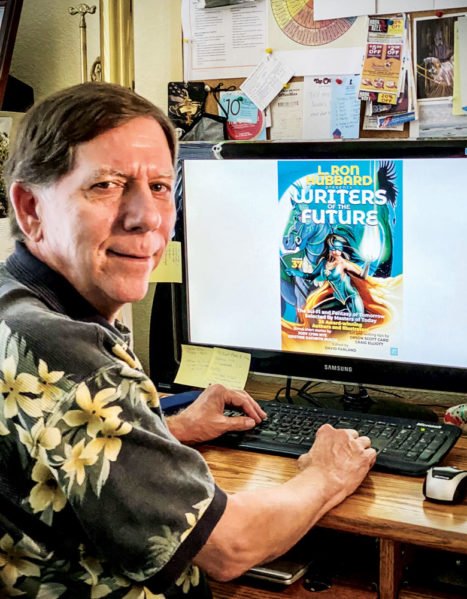
Local author John M. Campbell sits at the desk where he writes every morning and displays the cover of the anthology that will soon publish his latest short story.
Front Porch photo by Steve Larson
“Can they become like us? Can an Artificial Intelligence [AI] learn to love?” These are the kinds of questions that interest John M. Campbell, Central Park resident and science fiction author. His soon-to-be-published short story, “The Tiger and the Waif,” explores this possibility as it juxtaposes the most basic and low-tech of items—a child’s stuffed animal—with its AI “brain” that becomes self-aware.
Campbell doesn’t think this possibility is too far off. He imagines that in twenty years, manufacturers will be able to program toys with AI, for example, that might “reward” the AI for doing something that brings joy to a child. As the AI continues to seek these rewards, he wonders “at some point, is that any different from an aspect of love?”
His story’s inspiration came from the hand-held “pets” his children used to play with, but Campbell has long been fascinated by AI. He began reading science fiction at age 11 or 12, gravitating towards the stories of Ray Bradbury and Isaac Asimov. One of his favorite titles still comes readily to mind: Robert Heinlein’s The Moon is a Harsh Mistress. Set amid a human colony living on the moon, Heinlein’s tale includes an AI that acquires consciousness and helps humans to become independent from the Earth. “I think we’re coming closer and closer to that becoming a reality,” Campbell says. “Eventually, AIs will become smarter and smarter…I don’t know if I will live to see it, but my children might.”
Campbell is an avid reader of both science fiction and science. Though some science fiction tends to be apocalyptic in nature, his preferred style of science fiction tends to be optimistic about humanity and the future. A child of the 1960s, he reflects on the way TV shows like Star Trek envisioned a future world where races and peoples across the galaxy interacted in positive ways, learning from each other. Even when he considers some of the most pressing contemporary social and scientific concerns, he reflects this same optimism in humanity and in science. “As a scientist, we currently face the big question of global warming and whether we will survive and what is the world going to be like in 50 years…and I’m still optimistic that science will find ways to reverse this problem. Technologies will be invented because they need to be invented…and we will find biological ways to absorb more carbon dioxide.”
An aerospace engineer for over three decades, Campbell worked on a host of computer systems for the Department of Defense and a number of “three-letter” intelligence services; that work included operating “a global communication system that supplied intelligence reports to the U.S. Navy.” Some of his work had a strong element of science fiction, including software to control the onboard systems for stealth bombers. A lot of creativity was involved in this work, as he and his team overcame aerospace challenges to meet a particular goal “to improve intelligence or fighting capabilities.” Solutions he helped develop are common now on commercial aircraft, he says.
His creativity took a different shape upon retirement in 2015, when Campbell decided to pursue science fiction writing. He credits the Rocky Mountain Fiction Writers and a critique group he meets with monthly for helping him to hone his craft as an author. The workshop group in particular, he says, helps build confidence as he works through ideas. The comradery and support helped as he fielded rejection letters, an experience all writers share regardless of genre.
“Even when this story [“The Tiger and the Waif”] was getting rejected, I thought it might not fit a particular anthology…but I really believed in it.” So he kept trying to find the right publication, and recently received an award and a publication home. Along with the prize, Campbell will travel to Los Angeles for a week-long series of events to celebrate the story’s publication in the November 2021 Writers of the Future anthology.
“I’m a big believer that you strive and you learn more from your failures than your wins,” says Campbell, who is already working on his next project. He doesn’t offer many specifics but reveals that it’s based on string theory, which posits that there are extra dimensions beyond the familiar three (height, width, length) and Einstein’s spacetime. Campbell wants to explore what might happen if people could learn to open a hidden dimension and use it for clandestine activities.
It seems little is outside the realm of possibility for Campbell, which seems fitting given his genre. To follow Campbell or learn more about his upcoming publication—which will be available for purchase on Amazon—visit his website at https://www.johnmcampbell.com/


0 Comments